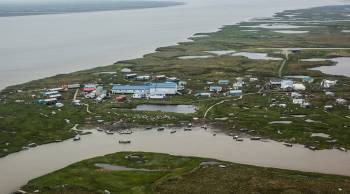Summer ice melt in the Arctic sets yet another record
Five years ago, Arctic sea ice shrank to a new low. Now, even that record’s been shattered; the ice pack now is 18 percent smaller. That’s a difference the size of Texas.
“We are now in uncharted territory,” says Mark Serreze, director of the National Snow and Ice Data Center at the University of Colorado, Boulder. “While we’ve long known that as the planet warms up, changes would be seen first and be most pronounced in the Arctic, few of us were prepared for how rapidly the changes would actually occur.”
The downward plunge in ice mirrors a separate chart trending up: the prospects of an ice-free Arctic waterway for the shipping industry. For now, steaming across the roof of the world remains experimental: 34 ships made the trek last year, carrying more than 800,000 tons of fish, minerals and gas. This year’s totals stand to surpass that.
But what’s worrying to some are that ships spew not just heat-trapping carbon dioxide, but also soot, which darkens Arctic ice.
“The Arctic and glaciers on mountains can’t reflect the heat back into space,” says Nick Nuttall of the U.N. Environment Programme. “And, as a result, you get accelerated melting. So we’ve got a kind of un-virtuous circle.”
In London today, a parliamentary panel endorsed a moratorium on Arctic shipping. But to many in industry it’s just a matter of time before lawmakers iron out the rules and Arctic shipping goes commercial.
Economic consultant Paul Bingham at CDM Smith notes sailing over the top of the world — instead of having to go south through the Panama or Suez Canals, or even South Africa’s Cape of Good Hope — can cut a transcontinental trip by 30 percent. That would save fuel, as well as CO2 emissions.
“If we do this, perhaps we’re actually going to substantially reduce our emissions,” Bingham says. “It’s perhaps not so simplistic what the actual costs and benefits are.”
Perhaps. Still, shipping and oil companies in the Arctic stand to take some lumps for contributing to global warming and then profiting from it. Is that fair?
“Blaming industry is a cop-out,” says energy professor Daniel Kammen at the University of California-Berkeley. “Because industry is supposed to react in fair and legal ways to the rules they are given.”
To Kammen, the key for Arctic nations is to hammer out the environmental rules of development — before industry takes over in the melting race ahead.
There’s a lot happening in the world. Through it all, Marketplace is here for you.
You rely on Marketplace to break down the world’s events and tell you how it affects you in a fact-based, approachable way. We rely on your financial support to keep making that possible.
Your donation today powers the independent journalism that you rely on. For just $5/month, you can help sustain Marketplace so we can keep reporting on the things that matter to you.


















